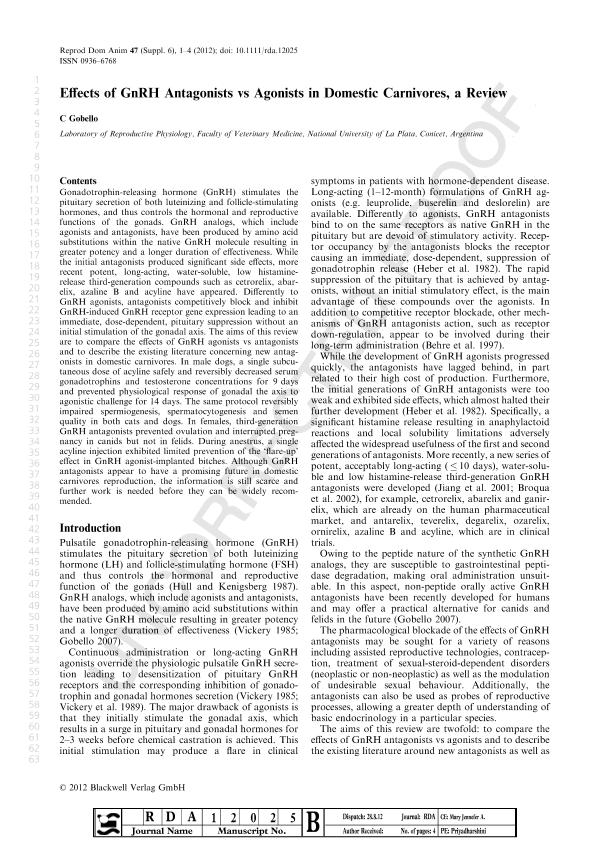Mostrar el registro sencillo del ítem
dc.contributor.author
Gobello, María Cristina

dc.date.available
2023-03-21T18:30:36Z
dc.date.issued
2012-08
dc.identifier.citation
Gobello, María Cristina; Effects of GnRH Antagonists vs Agonists in Domestic Carnivores, a Review; Wiley Blackwell Publishing, Inc; Reproduction in Domestic Animals; 47; SUPPL. 6; 8-2012; 373-376
dc.identifier.issn
0936-6768
dc.identifier.uri
http://hdl.handle.net/11336/191287
dc.description.abstract
Contents: Gonadotrophin-releasing hormone (GnRH) stimulates the pituitary secretion of both luteinizing and follicle-stimulating hormones, and thus controls the hormonal and reproductive functions of the gonads. GnRH analogs, which include agonists and antagonists, have been produced by amino acid substitutions within the native GnRH molecule resulting in greater potency and a longer duration of effectiveness. While the initial antagonists produced significant side effects, more recent potent, long-acting, water-soluble, low histamine-release third-generation compounds such as cetrorelix, abarelix, azaline B and acyline have appeared. Differently to GnRH agonists, antagonists competitively block and inhibit GnRH-induced GnRH receptor gene expression leading to an immediate, dose-dependent, pituitary suppression without an initial stimulation of the gonadal axis. The aims of this review are to compare the effects of GnRH agonists vs antagonists and to describe the existing literature concerning new antagonists in domestic carnivores. In male dogs, a single subcutaneous dose of acyline safely and reversibly decreased serum gonadotrophins and testosterone concentrations for 9 days and prevented physiological response of gonadal the axis to agonistic challenge for 14 days. The same protocol reversibly impaired spermiogenesis, spermatocytogenesis and semen quality in both cats and dogs. In females, third-generation GnRH antagonists prevented ovulation and interrupted pregnancy in canids but not in felids. During anestrus, a single acyline injection exhibited limited prevention of the 'flare-up' effect in GnRH agonist-implanted bitches. Although GnRH antagonists appear to have a promising future in domestic carnivores reproduction, the information is still scarce and further work is needed before they can be widely recommended. © 2012 Blackwell Verlag GmbH.
dc.format
application/pdf
dc.language.iso
eng
dc.publisher
Wiley Blackwell Publishing, Inc

dc.rights
info:eu-repo/semantics/openAccess
dc.rights.uri
https://creativecommons.org/licenses/by-nc-sa/2.5/ar/
dc.subject
analogs GnRH
dc.subject
dog
dc.subject.classification
Ciencias Veterinarias

dc.subject.classification
Ciencias Veterinarias

dc.subject.classification
CIENCIAS AGRÍCOLAS

dc.title
Effects of GnRH Antagonists vs Agonists in Domestic Carnivores, a Review
dc.type
info:eu-repo/semantics/article
dc.type
info:ar-repo/semantics/artículo
dc.type
info:eu-repo/semantics/publishedVersion
dc.date.updated
2023-03-20T14:59:43Z
dc.journal.volume
47
dc.journal.number
SUPPL. 6
dc.journal.pagination
373-376
dc.journal.pais
Reino Unido

dc.journal.ciudad
Londres
dc.description.fil
Fil: Gobello, María Cristina. Universidad Nacional de La Plata. Facultad de Ciencias Veterinarias; Argentina. Consejo Nacional de Investigaciones Científicas y Técnicas. Centro Científico Tecnológico Conicet - La Plata; Argentina
dc.journal.title
Reproduction in Domestic Animals

dc.relation.alternativeid
info:eu-repo/semantics/altIdentifier/doi/https://doi.org/10.1111/rda.12025
dc.relation.alternativeid
info:eu-repo/semantics/altIdentifier/url/https://onlinelibrary.wiley.com/doi/full/10.1111/rda.12025
Archivos asociados
